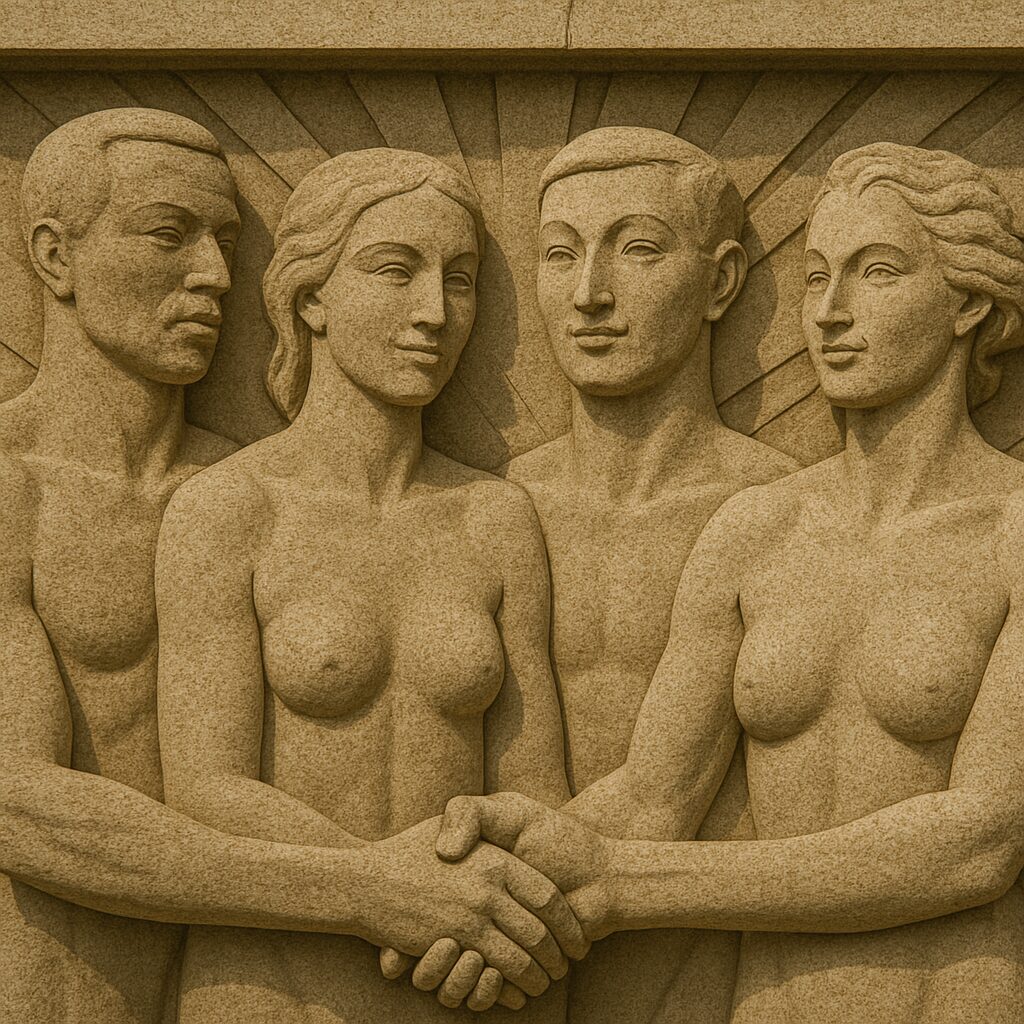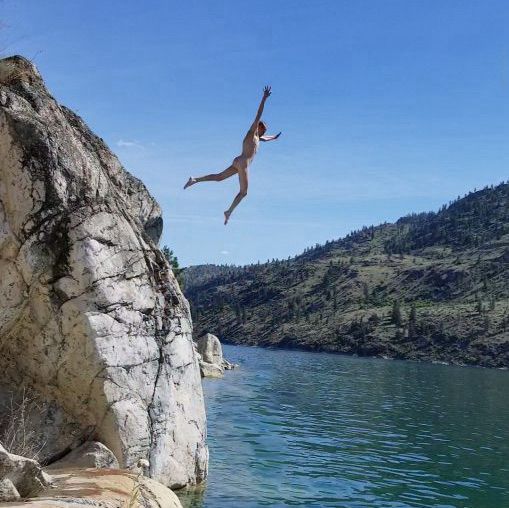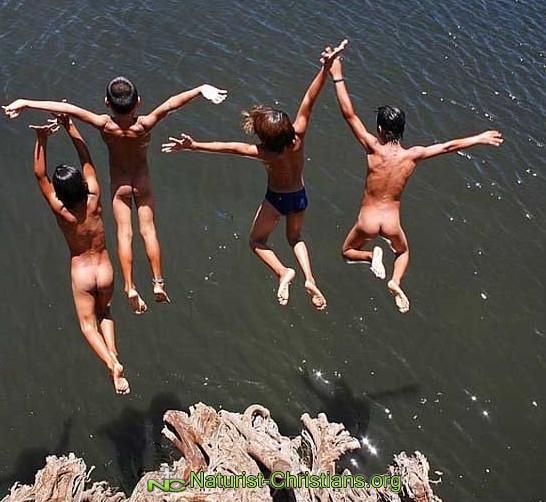A Bold Challenge to the System of Shame
Imagine standing on a mountaintop, feeling the sun warming your skin, the wind flowing over your body—no barriers, no shame, just pure human presence. Now ask yourself: Why does that image feel liberating yet uncomfortable? Why does our culture tell us that this fundamental state—the natural human form—is something to be hidden, feared, or condemned?
The truth is that we’ve been conditioned to view our own bodies as inherently shameful. For centuries, industries, institutions, and cultural norms have profited from convincing us that covering ourselves is dignified while nudity is disgraceful. This pervasive belief is more than just a mindset; it’s a deliberate manipulation designed to maintain control and exploit insecurity. It’s time to challenge that belief and reclaim the dignity that rightfully belongs to the human body.
The Dignity of Humanity: Embracing Our Authentic Nature

We humans have an incredible capacity for introspection, empathy, creativity, and growth. We are not just animals reacting to our environment—we are conscious beings who shape our world through choice and intention. We cooperate and work together. Our dignity lies not in how well we cover ourselves but in how honestly we live and how courageously we show up in the world.
Think about the times when you’ve felt most proud of yourself—when you’ve overcome challenges, stood up for what you believe in, or embraced your true self despite fear or judgment. That’s dignity. It’s the strength to be authentic even when it’s uncomfortable. It’s the power to live aligned with your values, without needing external validation.
But we’ve been taught to conflate dignity with modesty, to believe that hiding our natural form somehow makes us more respectable. The reality is, dignity doesn’t come from fabric wrapped around us. True dignity comes from embracing our full humanity—without shame, without fear, and without hiding who we are.
The Dignity of the Human Body: A Marvel of Evolution

Your body tells a story—a story of survival, adaptation, and the profound capability to live and thrive. Every muscle, scar, wrinkle, and curve speaks of experiences and resilience. Why, then, should we hide this miraculous form out of shame?
Throughout history, many cultures have revered the human body as a symbol of excellence and pride. The ancient Greeks celebrated the naked form through athletic competitions, seeing it as a tribute to human excellence. Indigenous communities around the globe embraced nudity as part of daily life, without attaching shame or sin to it. The problem wasn’t the body—it was the changing attitudes driven by religious and moral agendas that sought to control how people saw themselves.
When you choose to embrace your body as it is, without judgment or fear, you take a bold step toward reclaiming your inherent dignity. Your body is not an object to be hidden but a living expression of who you are. Owning that reality means owning your worth—without apology or justification.
Nudity as an Affirmation of Dignity: Living Boldly and Without Shame

Imagine shedding not just your clothes, but your fear and insecurity as well. Imagine feeling completely at ease in your own skin, not as a challenge to others, but as a gift to yourself—a radical act of self-acceptance. That’s what nudity represents: not rebellion, but liberation.
Choosing nudity is about reclaiming what has been taken from you—the right to be whole and unashamed. It’s about rejecting the lie that your body must be concealed to be respected. Instead of hiding, you stand in your truth, declaring that your natural form is worthy of dignity and pride.
Too many industries profit from your insecurities—fashion, beauty, fitness—all telling you that your worth depends on how well you conform. But when you choose to be nude, you challenge those narratives. You say, “I am enough as I am,” and that bold declaration dismantles the shame that society has tried to impose on you.
Debunking Myths: Nudity and Sexualization

A common myth is that nudity inherently invites sexual attention. But does that hold up to reality? Think about it—when nudity is normalized, it loses its provocative edge. Covering the body often creates more intrigue and fetishization. When nudity becomes ordinary and natural, it ceases to be sensational. Cultures with normalized social nudity experience less body dysmorphia and fewer instances of sexual violence (1).
Choosing to embrace nudity is not about seeking attention—it’s about releasing fear and stepping into authenticity. It’s about letting go of the illusion that covering yourself makes you more dignified. Real dignity comes from choosing to be your fullest, most authentic self.
The Personal Liberation of Body Freedom

Living without shame is life-changing. Imagine the weight of insecurity lifted from your shoulders. Imagine looking at yourself without judgment, accepting every part of your body as worthy of love and pride. When you reclaim your body as your own, you free yourself from the cycle of self-criticism and comparison.
Embracing social nudity fosters confidence, reduces anxiety, and deepens connections with others. It shows you that your value doesn’t come from how well you conform to arbitrary standards. Instead, it comes from your willingness to be real and unguarded. Your naked body is not just flesh—it’s a symbol of your humanity, your courage, and your self-respect.
A Call to Reclaim Your Dignity

It’s time to reject the lie that nudity is undignified. By embracing your natural form, you assert your autonomy and reject a system that profits from your insecurities. Make the choice today to live boldly, openly, and without shame. Stand in your dignity, and let the world see that you own yourself completely.
Reflection Questions
- What beliefs about your body have been shaped by cultural norms, and how can you challenge them?
- How would embracing body freedom change the way you see yourself and your relationships with others?
- What steps can you take today to move toward full acceptance of your natural form?
Bibliography
- Dyer, R. (2017). Naked Truth: Social Nudity and Body Image. Journal of Social Psychology, 45(3), 234-249. https://doi.org/10.1080/00224545.2017.1328695
- Glancy, J. (2015). Ancient Greek Athletics and the Celebration of the Naked Human Form. Classical Quarterly, 65(1), 145-162. https://doi.org/10.1017/S0009838814000541
- Brown, A. & Thompson, M. (2019). The Impact of Body Shame on Psychological Well-Being: A Meta-Analysis. Psychology Review, 84(4), 572-593. https://doi.org/10.1037/rev0000154


Leave a Reply